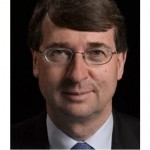
He grew up in Scunthorpe, North Lincolnshire attending the John Leggott School going on to read Physics at University College London. He started research working on galaxy dynamics in Cambridge in the 1970s after which he moved to California before spending 6 years on the staff of the US National Observatory in Tucson, Arizona. As part of the '7 Samurai' team he worked out a new way of measuring the distances to galaxies and discovered the 'Great Attractor', a huge concentration of galaxy clusters in the southern sky. He moved to Oxford in 1988 to lead the UK's participation in the construction of the 8m Gemini telescopes, in Hawaii and Chile. In 1994 he took up the post of Professor of Astronomy at Durham University returning to Oxford in 2002 where he was Chairman of the Physics Department from 2005-10 & Head of Astrophysics from 2011-14. He is the founding Director of the Oxford University Centre for Astrophysical Surveys which has been funded by the Hintze Family Charitable Foundation.
He was President of the Royal Astronomical Society 2010-12, a Fellow of University College London and holds a Honorary Degree from Claude Bernard University in Lyon, France. His research interests centre on cosmology and how galaxies form and evolve. He has a longstanding interest in astronomical instruments & telescopes. In recent years he has pioneered the use of a new class of astronomical spectrograph to measure the masses and ages of galaxies, as well as search for black holes in their nuclei.
Professor Roger Davies is the President of the European Astronomical Society.